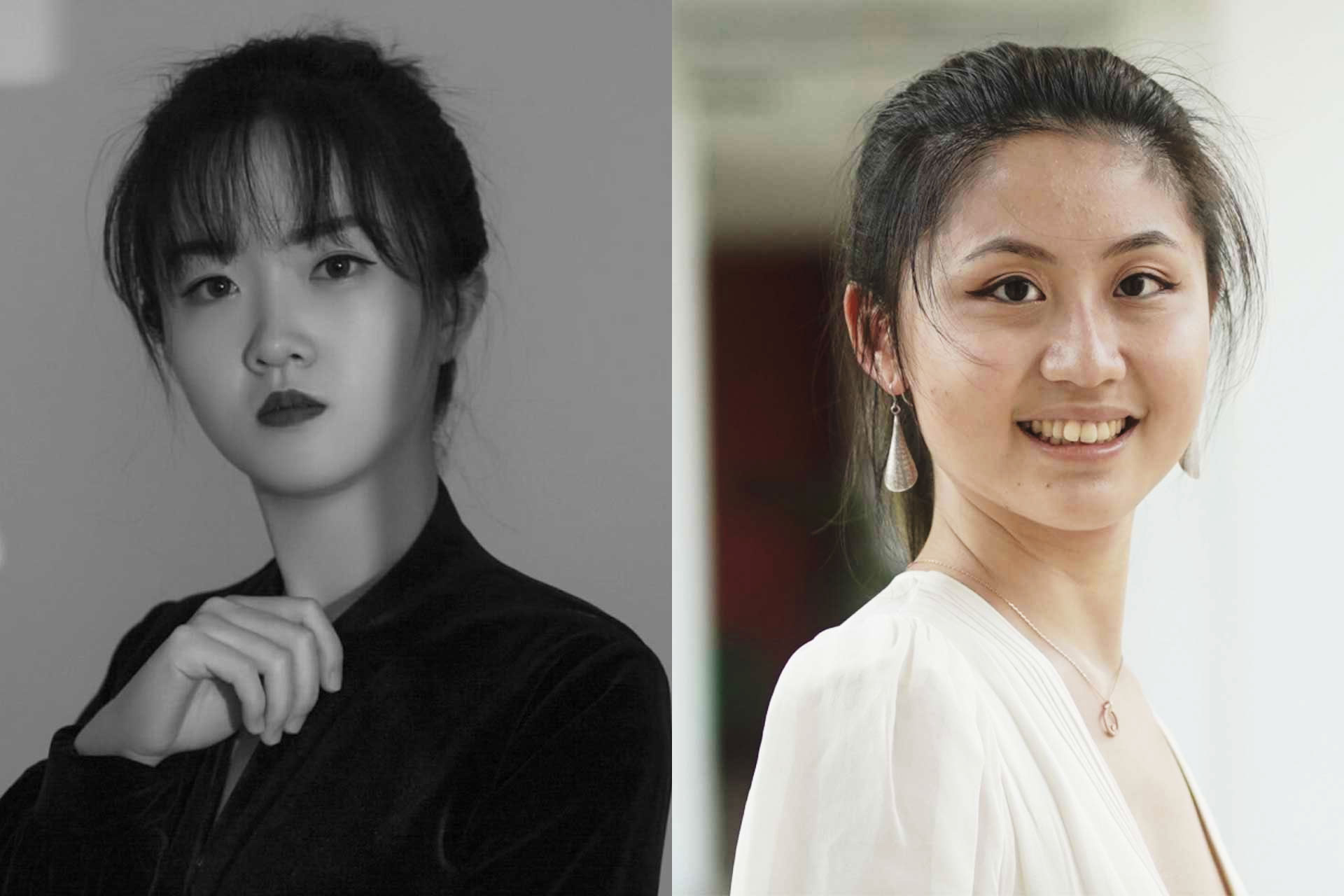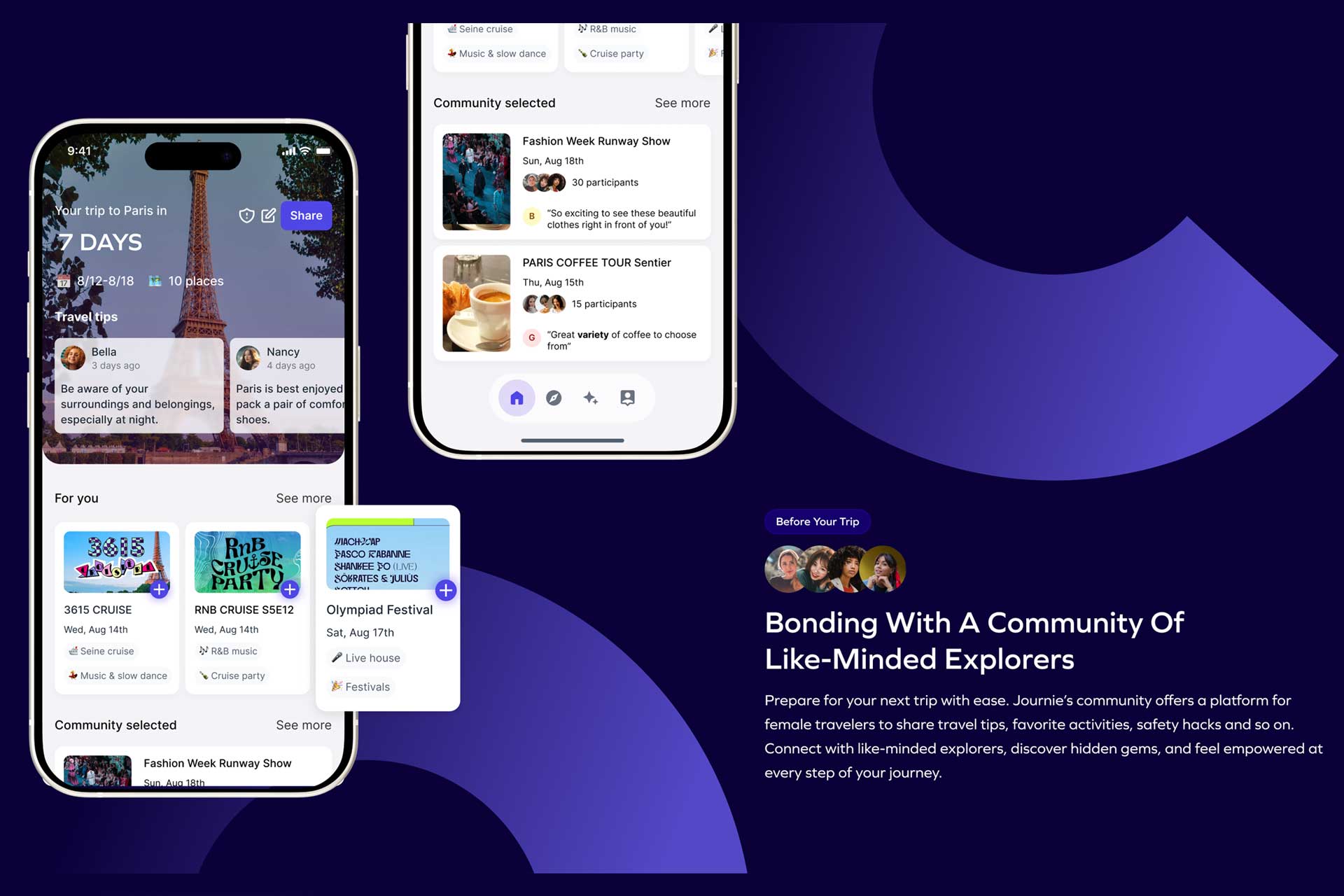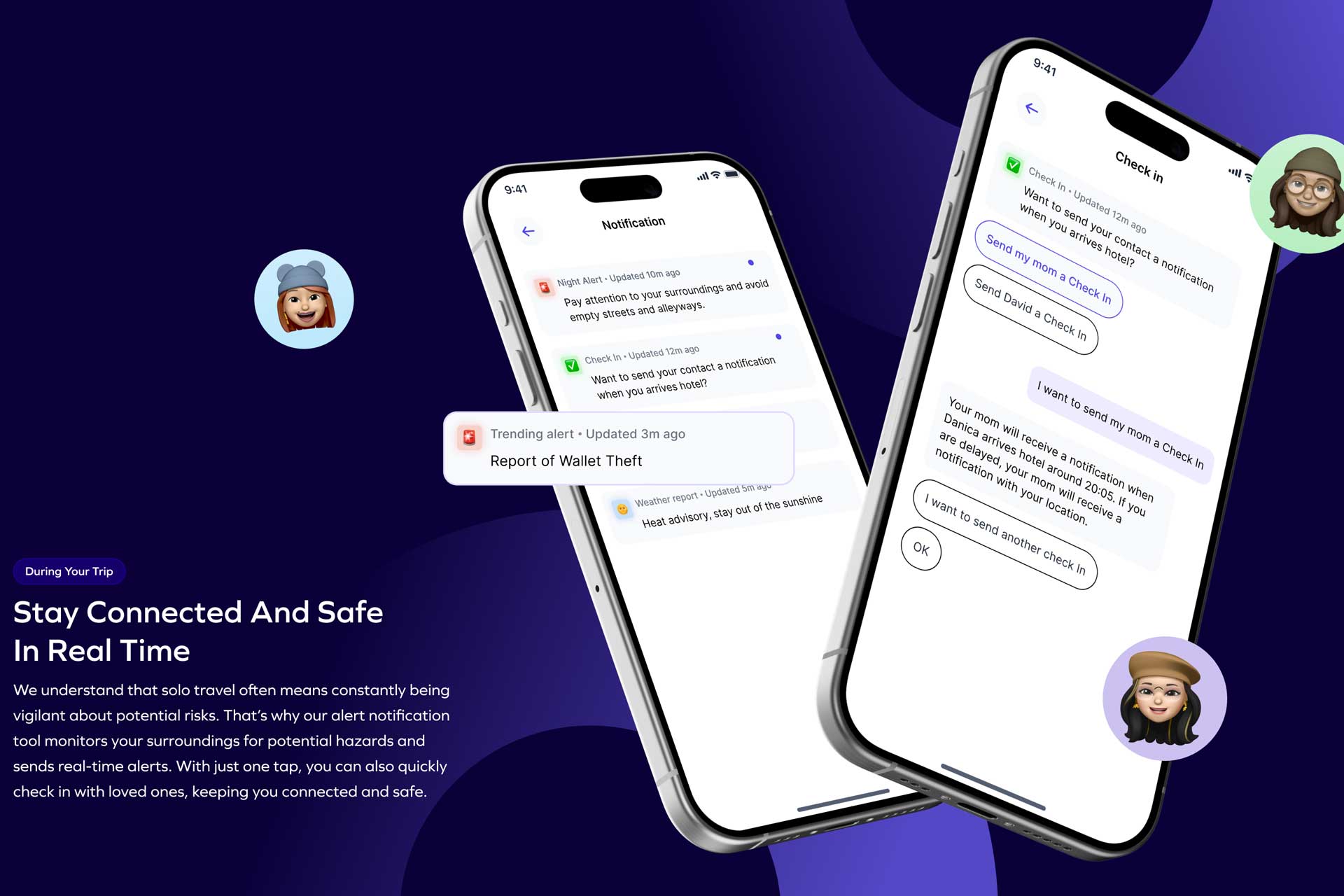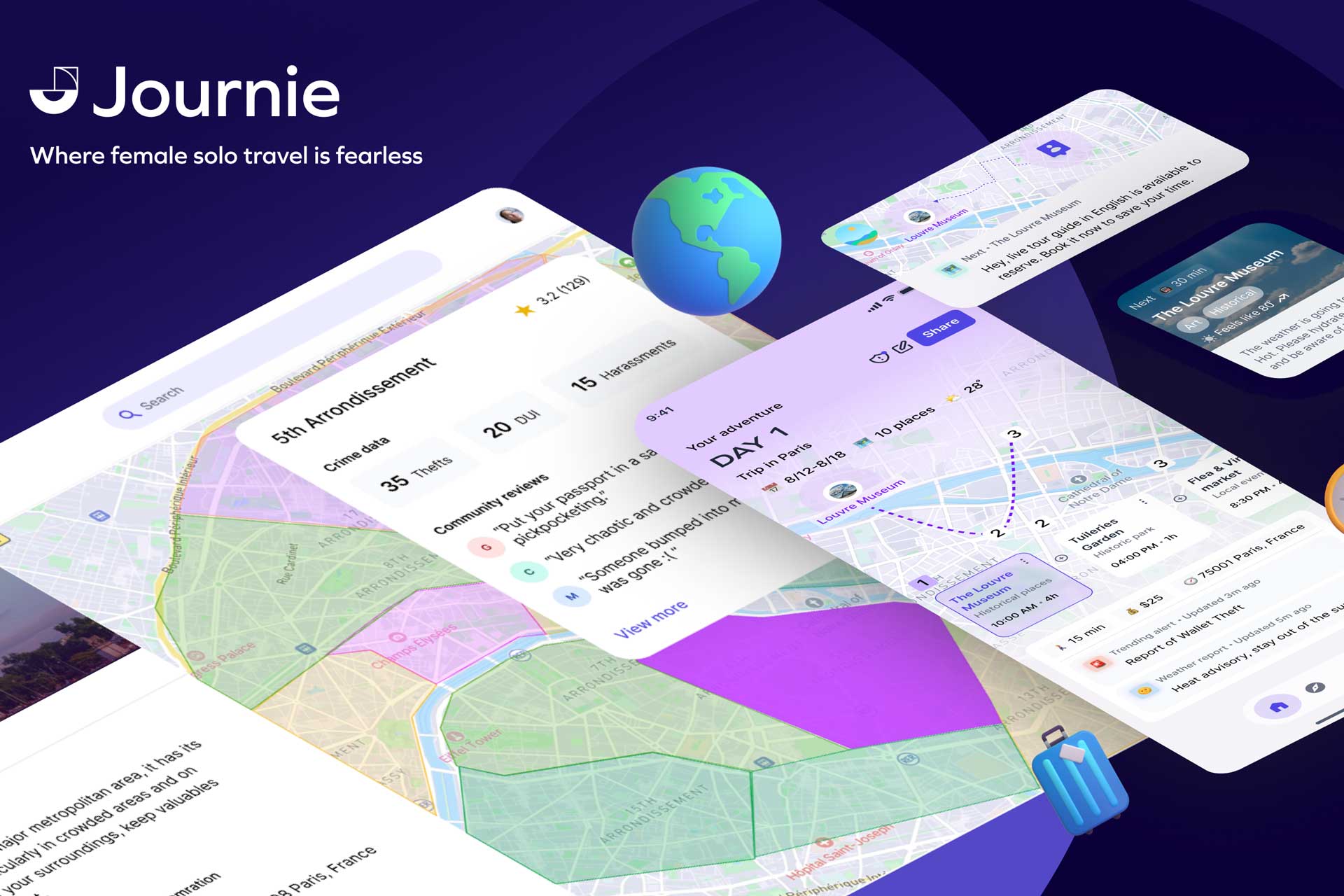Baoqi Ding & Yuanfei Zhao on Designing Journie for Solo Female Travelers

Photographer Alessio D’Addato | A Minimalist’s Storytelling
April 7, 2025
PA’s Next Made Real Campaign | Digital Transformation Approach
April 7, 2025Baoqi Ding & Yuanfei Zhao
Baoqi Ding, a UX designer and podcaster, brings a blend of physical and digital design to projects ranging from mobile healthcare apps to AI-powered education tools. Yuanfei Zhao, a UX designer at Kensho Technologies, focuses on innovative human-AI interactions. Their work includes Journie, an AI-powered travel platform designed to help solo female travelers explore the world safely and confidently.
Baoqi: I'm a UX designer and a podcaster. My design journey began in accessory design during my undergraduate studies. My thesis work on an interactive accessory led me to pursue a career in UX, where I could focus more on problem-solving and innovation.
Over time, I've worked on everything from developing mobile healthcare apps to creating AI educational tools for students and professionals. My background in both physical and digital design has allowed me to bring a unique perspective to every project, combining tactile creativity with user experience principles.
Yuanfei: My name is Yuanfei, and I’m a UX designer at Kensho Technologies, the AI innovation hub for S&P Global. I am passionate about exploring innovative ways for humans and cutting-edge technology to interact and thrive together.
I have worked on projects including a speech-to-text AI transcription tool, an AI-powered communication coach, and a data platform for cancer research.
Baoqi: From an early age, I was always curious about how things were made and how they functioned, whether it was a piece of jewelry or an app interface.
My transition into UX design stemmed from a desire to understand how things work and how they can improve people's lives. I realized that creativity is not just about aesthetics—it’s about creating meaningful interactions and solving real-world problems. I love how creativity can turn complex challenges into innovative solutions that enhance everyday experiences.
Yuanfei: I’m drawn to product design because it perfectly blends creativity and technical thinking. I love the aesthetic aspects that make things visually compelling, as well as the engineering that brings them to life.
For me, there’s something deeply rewarding about crafting experiences that are not only beautiful but also purposefully functional. I also thrive on the problem-solving journey—from identifying user needs to ideating effective solutions.
Baoqi: I'm a UX designer at Learneo, where I work to optimize AI-powered writing tools that serve millions of users worldwide. My role involves conducting user research, creating intuitive designs, and ensuring the platform remains accessible to a diverse user base.
Additionally, I am a podcast co-host and have several side projects. These are my daily motivations.
Yuanfei: I am a UX designer at Kensho Technologies, an AI financial company, where I focus on crafting engaging and intuitive experiences for users interacting with advanced artificial intelligence.
My work spans projects such as developing a speech-to-text transcription tool, designing benchmarks for Large Language Models (LLMs), and creating AI chatbots tailored for financial analysts.
Baoqi: For me, design is about bringing new perspectives to existing problems. It's about not settling for conventional solutions but pushing the boundaries to create something fresh and impactful.
I see design as a process of constant exploration, where research and empathy meet innovation. It's not just about crafting something visually beautiful; it's about designing with purpose and creating a seamless blend of form and function that elevates the user experience.
Yuanfei: Design is all about creating delightful experiences. It’s about crafting experiences that function well and resonate emotionally.
A delightful design goes beyond aesthetics and usability; it considers the user's journey, anticipates needs, and offers unexpected moments of joy or ease. It's like creating a harmonious story where every detail adds to a sense of flow and engagement.
Baoqi: My favorite kind of design is conceptual design because it pushes boundaries and explores new possibilities. It allows me to focus on what-if scenarios, imagining future solutions without being constrained by current limitations. I enjoy how it opens up space for creativity and experimentation.
Yuanfei: I really admire minimalist design that conveys purpose without clutter—it's the art of embracing simplicity while achieving a profound impact, where every element serves a function and the aesthetic remains effortlessly powerful.
Baoqi: A good design complements the innovative concept by grounding those concepts in real user needs. It's a process that blends empathy, ideation, and prototyping to ensure that even bold, imaginative ideas are innovative and relevant.
This balance between creativity and functionality makes design truly impactful for me. A good design solves a problem effectively while being intuitive and user-friendly.
Yuanfei: A great design begins with an empathetic understanding of the user—their needs, emotions, and challenges. By deeply grasping these insights, design becomes a powerful tool to create solutions that not only meet practical requirements but also resonate personally, addressing real needs with meaningful impact. Design by the people, for the people.
Baoqi: I would define my design style as minimalistic but bold. I believe in designing streamlined and focused experiences, removing unnecessary distractions to highlight what truly matters to the user.
My work often leans toward clean, uncluttered layouts that prioritize usability, but I'm not afraid to experiment with colors, interactions, or new technologies when they enhance the experience. Functionality always comes first, but I like to inject a sense of innovation that makes the design feel fresh and engaging.
Yuanfei: My design style is deeply rooted in understanding the root cause of problems. Too often, we jump to conclusions and create designs with solutions already in mind. I strive to approach each project with an open mind, immersing myself in the user's world to uncover their true needs and challenges.
My goal is to craft solutions that address genuine, underlying needs—ensuring designs resonate deeply rather than merely addressing surface-level issues.
Baoqi: My design process is deeply rooted in research and empathy. I always begin by immersing myself in the problem space—understanding the users, their pain points, and their goals. As we did for the Journie project, after gathering insights through interviews and observations, I moved into ideation, brainstorming solutions, sketching concepts, and considering different scenarios.
Prototyping and user testing are essential to my process, as they allow me to validate ideas and refine designs based on real feedback. It's a highly iterative process, and I believe continuous learning and adaptation are crucial to creating user-centered solutions.
Yuanfei: My design process is structured, iterative, and deeply user-centered. Before diving into design, I begin by gathering contextual information to fully understand the landscape and position myself within the problem space.
From there, I reach out to potential users to gain insight into their needs, challenges, and goals. With these insights, I move into ideation, exploring innovative solutions and refining ideas until I land on one that not only addresses core user needs but is also technically feasible.
Baoqi: Yes, being born and raised in China has profoundly influenced my approach to design. The culture of craftsmanship, attention to detail, and balance between form and function have always resonated with me. Growing up surrounded by traditional Chinese art and architecture, I developed an appreciation for simplicity and harmony.
Yuanfei: Definitely. I think what makes design so unique and vibrant is that everyone brings their distinct backgrounds and cultural heritage into the work they create. As someone born in Shanghai, China, I’m inspired by the blend of tradition and modernity that defines the city.
This influence often shows up in my work, where I strive to create designs that are both timeless and innovative, honoring cultural depth while appealing to universal sensibilities.
Baoqi: Winning the 2024 NY Product Design Awards is incredibly meaningful for my teammate and me. It's an honor that motivates us to keep innovating and pushing the boundaries of what's possible in design and technology. I appreciate the effort that the award program put into this fantastic competition.
Yuanfei: Winning the NY Product Design Awards has been a true highlight for me this year. It’s an incredible confidence boost, affirming that my work has meaningful value and that my ideas resonate within the design community.
More importantly, this recognition fuels my passion to further develop this project, empowering women in their travels and making a lasting impact in a way that matters deeply to me.
Baoqi & Yuanfei: The winning project we entered into the 2024 NY Product Design Awards is Journie, an AI-powered travel app designed for solo women travelers. Journie empowers women to explore the world confidently by providing safety tips, custom travel plans, and an "Easy Check-In" feature that allows them to update loved ones about their location instantly.
We chose this project because we believe in creating technology that addresses real-world issues, and safety is a crucial concern for solo female travelers. With Journie, we wanted to make travel safer, more accessible, and empowering for women everywhere.
Baoqi & Yuanfei: The biggest challenge with Journie was synthesizing the vast insights we gathered from our user interviews. We spoke to solo female travelers from diverse backgrounds, each with unique experiences and safety concerns. Sorting through all that data to identify common pain points and translate them into actionable design solutions was time-consuming and complex.
Balancing the different needs—such as safety features, usability, and customization—required a lot of iteration. It was essential to distill these insights in a way that made the app feel personal yet universally helpful for solo women travelers.
Baoqi: Winning this award has boosted my visibility in the design industry and opened doors to more diverse, impactful projects. It has strengthened my reputation and led to exciting new opportunities that push me to keep evolving as a designer.
Yuanfei: Winning this award has been a tremendous confidence boost for me, fueling my passion for creating delightful and intuitive user experiences. It’s also an exciting opportunity for me to connect and collaborate with the broader design community, opening doors for meaningful exchange and growth.
Baoqi: First of all, new opportunities and challenges are everywhere. I enjoy the changing industry—there's always something fresh to learn and experience. Second, especially in enhancing people's lives, the emphasis on design to solve practical issues inspires me.
Finally, I value our designers' community. Designers are constantly willing to share ideas and grow together.
Yuanfei: Diversity, compassion and curiosity. I always enjoy conversations with people from our industry, as each person brings a unique perspective, a compassionate outlook of the world, and an insatiable curiosity to understand more about the world around us.
Baoqi: Traditional Chinese elements often influence Chinese design, such as the Five Elements theory of wood, fire, earth, metal, and water.
Yuanfei: The scale and speed of technology adoption in the design industry in China is very unique. With a large population engaging with new technologies, it’s fascinating to see how designers are creating solutions that make these innovations accessible and beneficial for everyone.
Baoqi: With the help of immersive technology like AI, AR, and VR, I see the design taking a step back and refocusing on humans, accessibility, and sustainability. Sustainability and ethical design will become central to the creative process as users and companies become more conscious of their environmental and social impact.
Inclusivity will also play an important role, ensuring that products and experiences are designed for everyone, regardless of ability or background.
Yuanfei: A big focus will be Human-centered AI design. As AI becomes more integrated into daily life, designers will increasingly focus on creating human-centered experiences with AI, emphasizing transparency, ethics, and empathy.
The role of UX designers may evolve to ensure AI interacts meaningfully and responsibly with users, blending human intuition with machine intelligence. I see this as an opportunity for us designers to take a lead in shaping the future of AI and design.
Baoqi: My advice would be to embrace curiosity and never stop learning. The design world constantly evolves, and being open to new technologies, ideas, and methodologies will keep you ahead of the curve.
It’s also important to stay grounded in user needs—always design with empathy and solve problems that genuinely impact people’s lives. Lastly, don’t be afraid to experiment and take risks. Some of the best people come from challenging conventional thinking and trying something new.
Yuanfei: Go forth and slay! Embrace the challenge, make bold moves, and leave your mark.
Baoqi: ADPList is a helpful platform where you can find mentors and design industry professionals. As I mentioned, I love the community culture within the design industry, and this platform greatly represents the supportive environment. It is a great space to learn from peers and experts in the field.
Yuanfei: As Baoqi mentioned, ADPList is an incredible resource—it connects you with fellow professionals, offering a space to seek advice, feedback, or anything else you need. One of the greatest strengths of the design industry is its people, so don’t hesitate to reach out to other designers through platforms like ADPList or other networks.
Embrace the community; it’s full of people eager to share insights and support each other’s growth.
Baoqi: I want to be a cook sometime in my life. I have researched the cooking classes near me, and I often spend tons of time on the weekends cooking and baking. I find a lot of parallels between designing and cooking. Both cooking and design usually involve balance, whether the balance of flavors in food or elements in a design.
Baoqi: My mother has been the one that has most inspired me during my life. Her opinion has been important in my life because she is the closest to me. Her experiences have shaped her life; I have sought out and considered this while deciding what direction to take in my future.
She encouraged me to follow my love of design and challenge myself. We have various characteristics, and our conversations always provide new perspectives.
Yuanfei: My family, they are my best support and make me feel like I can fall safe, and thus I feel more confident to take risks and explore life. They are both caring, strong-minded, and not afraid to speak up. I look up to them all the time.
Baoqi: My projects usually revolve around user engagement and needs. UX designers should always hold their hands when offering a solution and pay attention to the experience of consumers. Designing a product or producing content always has the end user in mind, so knowing their wants, behaviors, and pain areas will enable me to generate more successful solutions.
Yuanfei: My key to success lies in a commitment to empathy, continuous learning, and adaptability. For design specifically, it is important to balance creativity with a deep understanding of user needs, ensuring that each solution is innovative and genuinely impactful.
Baoqi and Yuanfei: Thank you again for this great opportunity. Cheers!
Journie: Where female solo travel is fearless | 2024
Baoqi Ding and Yuanfei Zhao
Baoqi Ding, a UX designer and podcaster, brings a blend of physical and digital design to projects ranging from mobile healthcare apps to AI-powered education tools. Yuanfei Zhou, a UX designer at Kensho Technologies, focuses on innovative human-AI interactions. Their work includes Journie, an AI-powered travel platform designed to help solo female travelers explore the world safely and confidently.
Explore the journey of Andi Zhou, the Silver Winner of the 2024 NY Product Design Awards. Zhou, a senior UX researcher at Amazon, drives global warehouse experience research. With a foundation in design and art history, Zhou has influenced UX in the automotive industry and pushes the boundaries of conceptual design for a more inclusive future. Zhou's work has been recognized in international awards and exhibitions.




